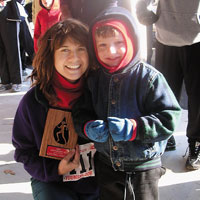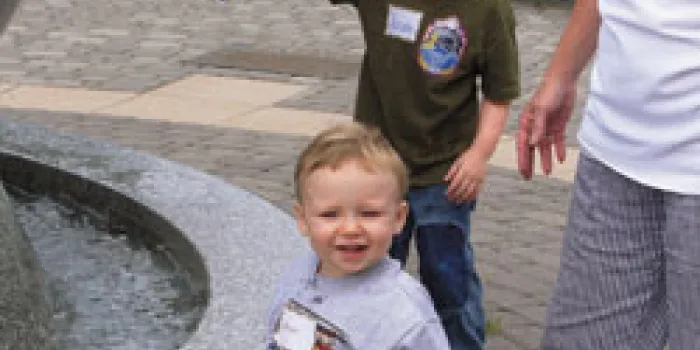In each issue of HemAware, we take a look at how local NHF chapters and associations are making a difference in their communities. This month we talk with Kevin O’Connor, president of the United Virginia Chapter of the National Hemophilia Foundation.
Parents of children with bleeding disorders can experience burnout from all the caregiving duties. What are the challenges for parents? How does your chapter address these challenges?
The challenges are not unlike those of all parents with regard to the multiplicity of responsibilities to their children, their jobs and themselves, but with the added burdens of caregiving for a child with a bleeding disorder. The biggest challenges are maintaining a balance and shifting priorities. At times, the bleeding disorder will demand to be the priority for medical reasons, but if the parent doesn’t recognize and find the time for personal time and care, burnout is highly likely. Sometimes we see that having a child with a bleeding disorder and another (or others) without a bleeding disorder can challenge the balancing and shifting of priorities. This can be an exaggeration of the “Mom always liked you better” attitude or the “baby in the family was spoiled” observation. Wrapped up in these statements are issues of self-worth and mental health that parents must deal with.
Our chapter addresses these challenges by facilitating social, educational and recreational interactions for parents, with and without their children. This helps the parents to not feel isolated with their problems, since they otherwise can seem exceptional and rare.
Talk about the events your chapter offers to help parents.
In the past five years, our chapter has had two parent preceptorship programs for new parents. The most recent one is in the final stages of the First Step Grant program from the National Hemophilia Foundation (2006–2007). These programs help the parents of newly diagnosed children with bleeding disorders to recognize symptoms and learn how to cope. They also underscore the fact that others are there to help.
 In addition to these formal programs, we have hosted “Moms Night Out,” “Dads in Action” (supported by the Hemophilia Federation of America), an annual “Sleep with the Fish” aquarium sleepover, and “Gettin’ in the Game” (the CSL Behring fitness program). We provide child care at our annual meeting so that parents can attend sessions on their own. We also host family retreats, as well as adult retreats and social functions.
In addition to these formal programs, we have hosted “Moms Night Out,” “Dads in Action” (supported by the Hemophilia Federation of America), an annual “Sleep with the Fish” aquarium sleepover, and “Gettin’ in the Game” (the CSL Behring fitness program). We provide child care at our annual meeting so that parents can attend sessions on their own. We also host family retreats, as well as adult retreats and social functions.
Any opportunity for parents and their children to interact gives all parents a better perspective on caregiving and coping.
In this community, kids go to camp and adults go on retreats. Describe a typical retreat and what you try to accomplish.
We held a family retreat on Memorial Day weekend 2007 at a camp near Charlottesville, Virginia, that specializes in camping experiences for children with medical problems and also provides programs for families. At a follow-up Family Day Camp in November 2007, we offered a lively mixture of traditional arts and crafts and group team building, including horseback riding (for those over six years old), a barbecue lunch and a presentation on exercise and joint health.
Retreat presentations have run the gamut from finding humor and fun in everyday experiences and problems to medical issues addressed by speakers provided by the hemophilia treatment center or industry. Our family retreats usually have about 12 families. They have lots of “organized” recreation as well as free time for “dis-organized” recreation.
What advice can you share about the planning and preparation stages for a retreat or camp?
Most of the planning on the chapter’s part is the selection of the date, time and place. We have a wonderful organization in our area called Camp Holiday Trails that works with us to plan the structure of the camp and retreats. It is a nonprofit organization started by some physicians from the University of Virginia Medical Center. The staff understands the needs of groups and children like ours.
In preparation for camp this year, we sent the director of Camp Holiday Trails to NACCHO (North American Camping Conference of Hemophilia Organizations) in Arizona. This helped provide the director with an even more intimate understanding of the needs of our families and children.
The United Virginia Chapter of NHF is located in Richmond. To contact the chapter, call 804.740.8643 or visit www.vahemophilia.org.

